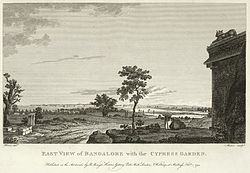Hyder Ali
Hyder Ali (Urdu: ur, Kannada: ಹೈದರಾಲಿ, Haidarālī; Hindi: हैदर अली, Haidar Alī; c. 1720 – 7 December 1782, 2 Muharram 1197 in the Islamic calendar) was the de facto ruler of the Kingdom of Mysore in southern India. Born Hyder Naik, he distinguished himself militarily, eventually drawing the attention of Mysore's rulers. Rising to the post of dalwai, or commander-in-chief to Krishnaraja Wodeyar II, he came to dominate the titular monarch and the Mysore government, and eventually seized control of all of the reins of power. He expanded the kingdom's borders at the expense of the Maratha Empire and Nizam of Hyderabad (among others), and was one of the few local rulers to effectively blunt the military advances of the British East India Company during two wars. In the First and Second Anglo-Mysore Wars he came within striking distance of the British outpost at Madras. He was given a number of honorific titles, and was referred to as Sultan Hyder Ali Khan or Hyder Ali Sahib.
| Hyder Ali | |
|---|---|
| Dalwai of Mysore (de facto ruler) | |
 | |
| 1761–1782 | |
| Predecessor | Krishnaraja Wodeyar II |
| Successor | Tipu Sultan |
| Born | c. 1720 Budikote Kolar in present-day Karnataka |
| Died | 6 December 1782 Chittoor |
| Burial | |
| House | |
| Father | Fatah Muhammad |
| Religion | Islam |
As a ruler
Hyder's rule of Mysore was characterised by frequent warfare with his neighbours and rebellion within his territories. This was not unusual for the time, as much of the Indian subcontinent was then in turmoil, with the Maratha Empire struggling with the remnants of the Mughal Empire. He was a shrewd leader, and left his son Tipu Sultan a kingdom that was significantly larger than when he first took it over. He organised his military in part along European lines, and was a pioneer in the military use of rocket artillery. He had at two wives, and fathered at least three children.
Hyder Ali Media
Hyder Ali as a young soldier (Sepoy).
The dominions of the Kingdom Of Mysore ruled by Hyder Ali, in the year 1780.
Krishnagiri Fort was besieged in the first Anglo-Mysore war in 1768, and finally surrendered to the English, who held it briefly
Asaf Jah II opposed the East India Company in 1766, and initially allied himself with Hyder Ali during the First Anglo-Mysore War, particularly during the Battle of Chengam, but later abandoned (in 1768) and later intervened in favor of Mysore during the Battle of Kharda in 1795.






